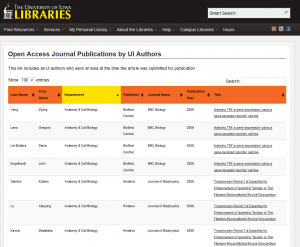Earlier this month, Science published a news article (“Who’s Afraid of Peer Review?”) by John Bohannon, a reporter and Harvard University biologist, that investigates the quality of the peer-review process at some fee-charging, Open Access journals in the life sciences. Bohannon submitted a credible, yet “hopelessly flawed” scientific article on cancer research to 304 relevant, fee-charging Open Access journals, 158 of which accepted it for publication It is worth noting that journals from the Public Library of Science, BioMed Central, and Hindawi, the three biggest Open Access publishers, rejected the paper outright.
The news of this study sparked spirituous debate in the blogosphere and the popular media (especially in the comments sections), oftentimes confounding its implications on the future of science, open access, and peer-review. As we approach Open Access Week (Oct. 21-27), it is important to consider what this article means in the broader context of scholarly communication.
“The takeaway shouldn’t be that Open Access is broken and not worth trying. Open Access is great and everyone believes that. It’s just a question of how to implement it.” – John Bohannon on NPR.
While Bohannon’s article uncovers problems in academic publishing, it is not clear that any of the problems are specific to Open Access. Bohannon specifically studied a subset of Open Access journals (many of which were known to be problematic) as a response to his colleague’s experience with a publishing scam, in which a fraudulent scientific journal collected publication fees from the author without performing any legitimate peer-review. Given the scope of this question and the nature of the fake research paper, the findings represent less than 4% of Open Access journals, of which less than 2% accepted the bogus paper (figures according to the Directory of Open Access Journals). Because the article did not study subscription based-journals, non-fee charging journals, non-English journals, and non-life sciences journals, it cannot be concluded that the problem is unique to Open Access.
One major effect of Bohannon’s work is the fascinating discussion on Open Access and peer-review that emerged in the wake of his article. Michael Eisen, a UC-Berkeley Biologist and co-founder of the Public Library of Science, suggests that the problem Bohannon’s study reveals is in the antiquated and opaque standards of the peer-review process. Peter Suber, Director of the Harvard Office of Scholarly Communication, reminds us that Open Access is not just about publishing; to tie this news to Open Access is to ignore the far more popular Open Access archiving option (such as depositing work in Iowa Research Online or PubMed Central) which is compliant with most traditional publishing agreements. Not interested in reading other blogs? Take a listen to this Science Live Chat with John Bohannon on the response to his study.
News like this reminds us that changes in the scholarly publishing system can be far more nuanced than expected and that it is important to continue these discussions as members of the scholarly community.


